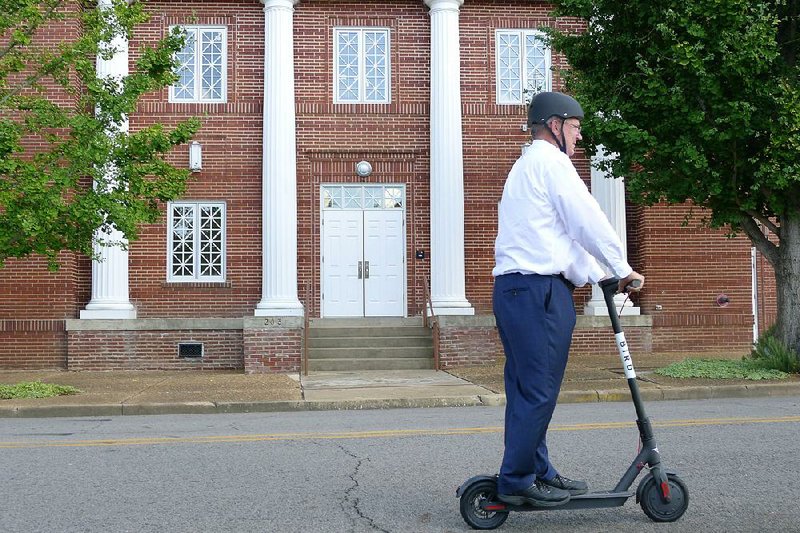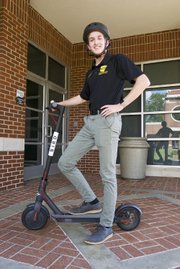RUSSELLVILLE -- The Birds have landed.
One hundred electric scooters popped up around Russellville a week or so ago.
Mayor Randy Horton knew they were coming. He just didn't know there would be so many.
"I didn't realize how widespread they'd be, so it was a little bit of a surprise," he said.
The dockless, shared scooters were distributed Sept. 20 by a company called Bird, which agreed to "nest" 75 scooters at Arkansas Tech University.
It was the company's first foray into Arkansas, with Russellville and Tech now having a combined 175 Bird scooters available for public use.
Horton supports the scooters.
"There are a lot of places that I don't want to take my three-quarter-ton truck out to," he said. "I'll just take a Bird instead."
After putting 75 scooters at Tech, a Bird representative asked Horton if the company could distribute some around town. The mayor was all for it.
"The extra 100, I think that was a test shot to see how much ridership they'd get," Horton said.
Bird can always take some of the scooters out of operation if they're not being used, he said.
Russellville has a population of about 27,920, and Tech has about 12,000 students enrolled. Tech's campus is about a mile north of downtown Russellville.
The scooters have been popular at Tech, said Jayson Simmons of Little Rock, the student government president. He spearheaded the effort to get electric scooters on campus after seeing how popular they were in Washington, D.C. Simmons was an intern in U.S. Sen. Tom Cotton's Washington office this summer.
"We decided it was a good opportunity to give students an alternative transportation option and to help out with the environment," Simmons said.
Over the first 11 days of operation at Tech, there have been 6,151 total rides on the 75 Bird scooters, said Sam Strasner, a spokesman for the university. The average ride was 1.11 miles and 11 minutes.
"Through 11 days, the Bird scooter rides at ATU have avoided an estimated 6,057 pounds of carbon dioxide emissions if riders had taken their automobiles instead," Strasner said.
After downloading the Bird smartphone app, riders in Russellville can find a scooter, unlock it and go for a ride. The cost is $1 plus 20 cents per minute. The maximum one-day charge is $100.
The scooters can go up to 15 mph. Helmets are recommended, and Bird has provided free helmets to Tech students.
A rider must be at least 18 years old and have a valid driver's license. According to the Bird rental agreement, rider and cargo must not exceed 200 pounds.
The scooters are street-legal but are best used in bike lanes, Simmons said. Bird.co/how says don't ride them on sidewalks.
"I've seen people ride these things to the lake, to Walgreens, CVS, Walmart and to work out," Simmons said. "It's a combination of fun and commuting."
Riders can leave them in any public place where they are out of the way of pedestrians and traffic, Simmons said. Bird recommends leaving them at bicycle racks when possible.
The scooters have lights so they can operate at night, but they can't be rented after 9 p.m., Simmons said. After that time of night, "bird hunters" pick up the scooters, charge them and return the scooters to their "nests" so riders can find them there the next morning.
People can ride the scooters from Tech to downtown and leave them there, and vice versa. But the scooters are "nested" during the night back at their original locations.
Simmons said Tech has 15 "nests," each with five scooters.
Based on a contract with Bird, Tech's student government gets $1 per day per scooter. That adds up to $27,375 a year. Simmons said that's money that can be invested in other student safety measures, like better roads and sidewalks.
Some larger cities have banned electric scooters, but that's because five companies started competing for those markets, and scooters were suddenly everywhere, Simmons said.
"The good thing about us is we don't have multiple companies," he said. "We have one company providing scooters."
Horton said the city has no contract with Bird regarding the other 100 scooters that are around town. But that's OK because he wants to support the university's efforts.
"It dovetails with our quality-of-place and quality-of-life efforts," Horton said.
The mayor said he has seen people riding the Bird scooters as far away as Lake Dardanelle State Park, which is about 6 miles from downtown Russellville.
Horton has had a few calls from people who were concerned about scooters being left on sidewalks or in the right of way of streets that are also state highways, like Arkansas Avenue, which is also Arkansas 7.
"If there gets to be too many of them, if they are blocking sidewalks, we'd have to have a conversation about that," he said, referring to the company.
Horton said the scooters may be a novelty for now.
"In three months, in January, we might see some of these Birds in Florida," he said.
Bird operates in more than 50 cities nationwide, but not yet in Florida, according to its website, Bird.co.
Capt. David Ewing with the Russellville Police Department said Friday that there had been no accidents reported regarding the scooters.
"If we were to have an accident involving one of the scooters, we would probably treat them as a bicyclist," he said, citing Arkansas Code Annotated 27-51-1702.
That subchapter of state law is called the Electric Bicycle Act. Electric bicycles are to be treated as regular bicycles, not motor vehicles, according to the act.
Ewing said bicycles are legal on wide, paved, multiuse trails but not on narrow sidewalks around town.
He said El Paso Avenue provides access from Tech to downtown with bicycle lanes most of the way.
A Bird spokesman declined to provide additional information when asked about the company's inroads into Arkansas.
Dane Eifling, coordinator of bicycle and pedestrian programs at the University of Arkansas, Fayetteville, said Bird and about five other electric scooter companies approached the university a month or so ago.
But UA and Fayetteville recently entered into an agreement with VeoRide to provide 340 shared-use bicycles, and Eifling wants to see how that goes before venturing into scooters. Fifty of the 340 VeoRide bikes are electric.
Eifling said there is no specific number of VeoBikes that are allotted to the UA campus, which is famously on a hill. But students have been riding the bikes downhill from campus and leaving them elsewhere in town. VeoRide has been hauling 100 bikes back to campus every day, Eifling said.
"Because the campus is at a high point, they're being distributed around town," he said.
The terrain in Fayetteville could be more of a challenge for scooters than for bicycles, Eifling said.
A relatively flat campus and downtown, like the one at Arkansas Tech and Russellville, might be more suitable for scooters, he said.
Arkansas State University is also partnering with VeoRide on bicycles and is not considering scooters for now, said Bill Smith, a university spokesman.
He said ASU was recently approached by Spin, another company, about a scooter partnership, but officials haven't heard from Bird.
Spin had the shared-bicycle contract with the University of Arkansas at Little Rock last year, said Judy Williams, associate vice chancellor for communications and marketing.
"The company wanted to discontinue the bike-share program but wanted us to consider their scooter program, which we decided not to do, opting instead to pursue another bike-share company," Williams said. "We haven't signed a contract for the new bike-share program but hope to do so soon."
The University of Central Arkansas in Conway hasn't been approached about any scooter partnerships, said Amanda Hoelzeman, director of media relations.
"We have, however, implemented the Zagster bike share initiative on campus," she said.
Simmons said scooter use usually increases after people get used to them.
Horton said he ran out of gas in his pickup on the way to work Thursday.
"I need a Bird in the back of my truck just for a backup plan," he said.
Horton said riders should be careful. It's easy to flip the Bird if the front wheel hits an obstacle.
Metro on 10/07/2018


